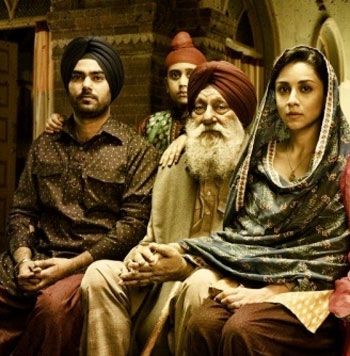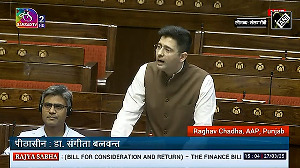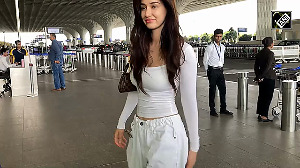 'Nikkhil Advani's POW shows a director's deft touch and is a promising start of a great story, top notch acting talent and a great behind the scenes production team,' notes film director Suparn Verma.
'Nikkhil Advani's POW shows a director's deft touch and is a promising start of a great story, top notch acting talent and a great behind the scenes production team,' notes film director Suparn Verma.
Nikkhil Advani directed POW Bandhi Yudh Ke, premiered on Indian television Monday, November 7, night.
It is an authorised adaptation of the Israeli drama Hatufim created by Gideon Raff.
The Israeli series was also adapted for American television as Homeland, which took the idea of Hatufim and over the various seasons has evolved into its own story.
POW deals with the escape and discovery of two Indian prisoners of war taken by Pakistan during the Kargil war. The effect those 17 years have taken on them, on their families, their wives and children.
For some, time has stood still, some have tried to move on, but still standing at their doorstep, waiting in hope for those familiar footsteps to walk home.
The emotional angle will be familiar to all Hindi film buffs about a couple in love, the man going to war, thought to be dead, the girl moves on and the man turns up from the dead again just when the girl has fallen in love/married/engaged to someone else.
This is where it all changes with POW.
What if those who returned have been brainwashed by the enemy and are no longer the 'Indian' soldiers they once were, but enemy combatants who now answer to a different master and so complete is their conversion that they have converted their religion as well?
Hatufim and Homeland are top of the line storytelling and extremely complex subjects with a deep emotional core centered around the two families of the returned soldiers.
What better setting than to adapt it to than India?
Nikkhil Advani shifted gears from romance to thrillers with the edge of the seat D-Day, which was about a plot by R&AW to capture Goldman, a thinly veiled name for Dawood Ibrahim. The film was a critical and box office success.
POW is hugely ambitious because Advani directs all 126 episodes instead of the usual scenario where a big name director sets up the show for someone else to direct the rest of the episodes.
To keep this review relatively spoiler free, Episode 1 gets to the point with the discovery of the soldiers, establishing the families and where they are at this point in their lives, quickly bringing in key characters from the NSA and R&AW to the final twist at the end of the episode.
One of the big issues Indian television suffers from is the promos look a certain way, but when the show starts it is an entirely different scale, look and feel.
In the list of positives the first thing is the show is shot on progressive format so it looks and feels like film rather than television with the grain structure resembling the same.
It works perfectly because the camerawork uses drone shots, or the way it is lensed is the way one would shoot film scenes rather than television.
The lighting and the production design are very well done with a lot of detailing.
My personal favourite are the opening shots of the escape and discovery of the POWs which involve use of flares by the soldiers. The lighting here by Shomick Mukherjee is pitch perfect.
One of my biggest issues about night lightning is rarely do DOPs show the night as black, it is either blue or in some filter which takes away from the magic of darkness. I mention this especially because in films some people tend to play it safe so you can imagine how safe one plays it on television.
This may seem like a small thing to be realistic, but it is detailing like this that starts to add up and gains momentum in the whole show.
POW has a great ensemble of really fine actors.
It is a joy to watch the talented Amrita Puri return to the screen. Sandhya Mridul has a meaty central role and you notice her relish the role and flex those acting muscles.
Satyadeep Mishra and Purab Kohli are proven actors and in the first episode hint at some glorious dramatics to come in the days to follow.
The one actor I was kicked about is Manish Choudhary. He is one of my favourite characters from Hatufim and Homeland and so far he has the best punchlines in the show.
Advani's team of writers (Aseem Arora, Aniruddha Guha, Gaurav K Chawla, Elisha Chopra) have a hard task cut out for them.
They have a razor sharp storyline with lots of characters and plot twists laced with enough emotional landmines to start a war.
Their biggest challenge is to adapt it to an Indian television palate so used to being force fed predigested food and shows that reflect a sensibility that is B-grade 1970s and 1980s.
Which is also ironic because the 1980s were the glory days of Indian television with Ramesh Sippy directing Buniyaad, Govind Nihalani Tamas, a host of great film directors making episodes of Katha Sagar, Manjul Sinha and Kundan Shah making Yeh Jo Hai Zindagi, Kundan Shah and Saeed Mirza making Nukkad, Basu Chatterjee directing Rajni.
Television is a writer's and director's medium which was taken over by executives trying to decipher TRPs and follow trends each week.
Nikkhil Advani's POW shows a director's deft touch and is a promising start of a great story, top notch acting talent and a great behind the scenes production team.
I hope it stays the course and in doing so corrects the course of Indian television which has drifted from where it once began.
May the glory days come again for great storytelling.











 © 2025
© 2025